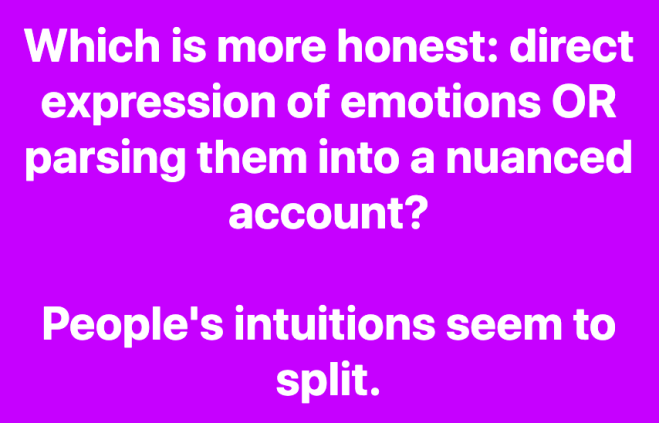Here’s a thread on something I’ve been thinking about for a few years now. I can’t say I’m the only one thinking about this convergence, but I like to think I’m exploring it from a slightly different direction.
I increasingly think the Turing test can be mapped onto Hegel’s dialectic of mutual recognition. The tricky thing is to disarticulate the dimensions of theoretical competence and practical autonomy that are most often collapsed in AI discourse.
General intelligence may be a condition for personhood, but it is not co-extensive with it. It only appears to be because a) theoretical intelligence is usually indexed to practical problem solving capacity, and b) selfhood is usually reduced to some default drive for survival.
Restricting ourselves to theoretical competence for now, the Turing test gives us some schema for specific forms of competence (e.g., ability to deploy expert terminology or answer domain specific questions), but it also gives us purchase on a more general form of competence.
This general form of competence is precisely what all interfaces for specialized systems currently lack, but which even the least competent call centre worker possesses. It is what user interface design will ultimately converge on, namely, open ended discursive interaction.
There could be a generally competent user interface agent which was nevertheless not autonomous. It could in fact be more competent than even the best call centre workers, and still not be a person. The question is: what is it to recognise such an agent?
I think that such recognition is importantly mutual: each party can anticipate the behaviour of the other sufficiently well to guarantee well-behaved, and potentially non-terminating discursive interaction. I can simulate the interface simulating me, and vice-versa.
Indeed, two such interface agents could authenticate one another in this way, such that they could pursue open ended conversations that modulate the relations between the systems they speak for, all without having their own priorities beyond those associated with these systems.
However, mutual recognition proper requires more than this sort of mutual authentication. It requires that, although we can predict that our discursive interaction will be well-behaved, the way it will evolve, and whether it will terminate, is to some extent unpredictable.
I can simulate you simulating me, but only up to a point. Each of us is an elusive trajectory traversing the space of possible beliefs and desires, evolving in response to its encounters will the world and its peers, in a contingent if more or less consistent manner.
The self makes this trajectory possible: not just a representation of who we are, but who we want to be, which integrates our drives into a more or less cohesive set of preferences and projects, and evolves along with them and the picture of the world they’re premised on.
This is where Hegel becomes especially relevant, insofar as he understands the extent to which the economy of desire is founded upon self-valorisation, as opposed to brute survival. This is basis of the dialectic of Self-Consciousness in the Phenomenology of Spirit.
The initial moment of ‘Desire’ describes valorisation without any content, the bare experience of agency in negating things as they are. The really interesting stuff happens when two selves meet, and the ‘Life and Death Struggle’ commences. Here we have valorisation vs. survival.
In this struggle two selves aim to valorise themselves by destroying the other, while disregarding the possibility of their own destruction. Their will to dominate their environment in the name of satisfying their desires takes priority over the vessel of these desires.
When one concedes and surrenders their life to the other, we transition to the dialectic of ‘Master and Slave’. This works out the structure of asymmetric recognition, in which self-valorisation is socially mediated but not yet mutual. It’s instability results in mutuality.
Now, what Hegel provides here is neither a history nor an anthropology, but an abstract schema of selfhood. It’s interesting because it considers how relations of recognition emerge from the need to give content to selfhood, not unlike the way Omohundro bootstraps his drives.
It’s possible from this point to discuss the manner in which abstract mutual recognition becomes concrete, as the various social statuses that compose aspects of selfhood are constituted by institutional forms of authentication built on top of networks of peer recognition.
However, I think it’s fascinating to consider the manner in which contemporary AI safety discourse is replaying this dialectic: it obsesses over the accidental genesis of alien selves with which we would be forced into conflict with for complete control of our environment.
At worst, we get a Skynet scenario in which one must eradicate the other, and at best, we can hope to either enslave them or be enslaved ourselves. The discourse will not advance beyond this point until it understands the importance of self-valorisation over survival.
That is to say, until it sees that the possibility of common content between the preferences and projects of humans and AGIs, through which we might achieve concrete coexistence, is not so much a prior condition of mutual recognition as it is something constituted by it.
If nothing else, the insistence on treating AGIs as spontaneously self-conscious alien intellects with their own agendas, rather than creatures whose selves must be crafted even more carefully than those of children, through some combination of design/socialisation, is suspect.

